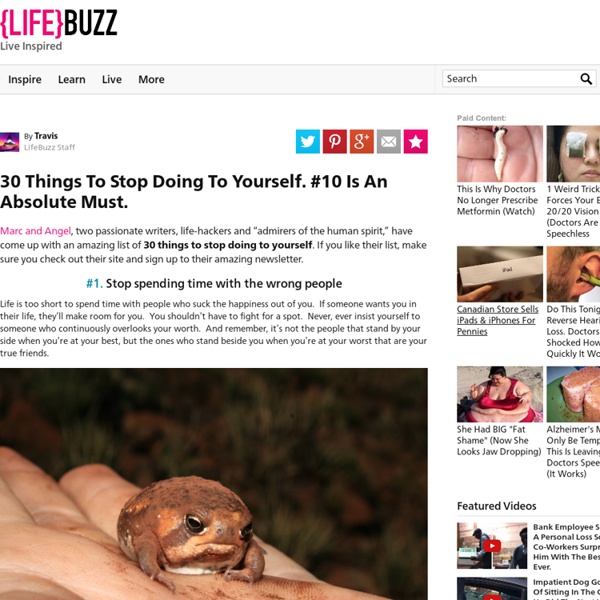Zen To Slim: A Simple, 5-Step Weight Loss Plan
Every Friday is Health Tip Day at Zen Habits. I think this one will be a bit controversial — weight loss theories seem to be a bit divisive, judging from past posts on this topics, as people have very strong opinions about the right way to lose weight. However, this post isn’t going to explore any of those theories.
30 Questions to Ask Yourself Before You Die
{Via studioflowerpower on etsy} “Rather than money, than fame, than love…give me truth.” ~ Thoreau I woke up this morning and my life clock marked 30. My first sleep-deprived idea was to pack a small suitcase, get on the first train, move to another country, change my name, change my hair color (or get plastic surgery if needed), and start from scratch. When I don’t know how to deal with life, I hide sometimes.
The Two Week Lifestyle Overhaul — Zen to Fitness The Two Week Lifestyle Overhaul : Zen to Fitness
corazón girl A while back I was thinking how cool it would be to write up a guide on how to give yourself a total lifestyle re-haul that wouldn’t cause you to sacrifice too much, just a two week period where you try your best in all areas of life to make some simple changes for the better. The three areas are: DietTrainingLifestyle
Griffin the Parrot Demonstrates the Ability to Share
Parrots are highly intelligent animals. The most famously brainy parrot, an African gray named Alex, was described as having the intelligence of a 5 year old child and the emotional capacity of a 2 year old. After Alex’s death in 2007, Dr. Irene Pepperberg from Harvard sought to continue the work she had been focusing on Alex with another African gray from her lab named Griffin. Though 19-year-old Griffin has not yet reached the level of Alex’s intellect (Griffin is still twelve years younger than Alex was at the time of his death, after all), he is still a highly impressive bird. The most recent paper is a follow-up study from work with Griffin from Dr.
zen habits
Experiments reveal that crabs and lobsters feel pain
Lobsters and other crustaceans may feel pain. Matthew Roy; Wikipedia Every year thousands of them are boiled or torn apart while they are still alive, and now there is strong evidence to suggest that crustaceans experience pain.
How Smart Are Dogs?
How Smart Are Animals? PBS Airdate: February 9, 2011 NEIL DEGRASSE TYSON (Astrophysicist, American Museum of Natural History): Hi, I'm Neil deGrasse Tyson, your host of NOVA ScienceNOW, where this season we're asking six big questions. On this episode: How Smart Are Animals? Meet Chaser. She's got a huge vocabulary.
Cetacean intelligence
Cetacean intelligence refers to the cognitive capabilities of the Cetacea order of mammals, which includes whales, porpoises, and dolphins. Brain size[edit] Brain size was previously considered a major indicator of the intelligence of an animal. However, many other factors also affect intelligence. Recent discoveries concerning bird intelligence have called into question the usefulness of brain size as an indicator.[1] Since most of the brain is used for maintaining bodily functions,[citation needed] greater ratios of brain to body mass may increase the amount of brain mass available for more complex cognitive tasks.[2][unreliable source?]



